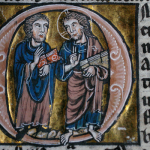Salt Lake City, Utah, Dec 18, 2016 / 04:09 am (CNA).- Editor's note: This article contains content that readers may find disturbing. Reader discretion is advised. Elizabeth Smart, who drew the nation’s attention when she was abducted from her home at age 14, said that her captor’s pornography use made her captivity much worse. “Looking at pornography wasn’t enough for him. Having sex with his wife, after looking at pornography, it wasn’t enough for him,” Smart said in a recent interview. “And then it led him to finally going out and kidnapping me. He just always wanted more.” In 2002, Smart was abducted at knifepoint from her bedroom when a man broke into a window in her family’s home in Salt Lake City. She was taken to a makeshift campsite just a few miles away, where her captor, Brian David Mitchell, and his wife held her for nine months, until she was discovered and rescued. During that time, Smart says that Mitchell declared her to be his new “wife” and raped her multiple times each day. Mitchell was later found guilty of kidnapping and sexual assault. He was sentenced to life in prison. Now, in an exclusive interview with Fight the New Drug, a group that works to educate people on pornography's effects on the brain and society, Smart discusses the role that pornography played in her captivity. In the interview, Smart describes what she calls “the longest nine months of my life.” “Every time when I thought I had hit rock bottom, my captor would find something new, to make it worse,” she said. “And one of those times, I had been forced to drink alcohol. I had thrown up and then I had passed out, face down. I woke up the next morning and my face and my hair were still all crusted to the ground, covered in vomit, and I remember at that point just feeling like, how can you get any lower than this?” But just a few days later, she continued, “my captor was just really excited and really kind of amped up about something.” It turned out his excitement was over hard-core pornography, which he forced her to look at. “I remember he would just sit and look at it and stare at it,” Smart said. “And he would just talk about these women. And then when he was done, he would turn and he would look at me, and he would be like, ‘Now we’re going to do this’.” “It just led to him raping me more. More than he already did, which was a lot.” Smart said she doesn’t know whether Mitchell would have kidnapped her had pornography not been involved. “All I know is that pornography made my living hell worse.” Smart’s interview comes as an increasing number of hotels, restaurants and states are recognizing the damage caused by pornography, as well as the link between pornography and human trafficking. Studies have found that porn is addictive and elicits a response from the brain similar to the use of drugs. In addition, research shows that regular porn users can develop a tolerance over time, needing more extreme pornography to become aroused. A 2012 survey of 1,500 men found that 56 percent said their tastes in pornography had become “increasingly extreme or deviant.” Porn users were also found to be more likely to express attitudes supporting violence against women. In her latest interview, Smart – who has gone on to get married, become a contributor to ABC News, and be an activist against human trafficking and pornography – also shared the life-changing advice that her mother gave her the morning after she was rescued. “What these people have done to you is so terrible, you may never feel like restitution is made, but the best punishment that you could ever give them is to be happy,” Smart’s mother told her. “And that advice has helped make me who I am today,” she said.Note: Resources on recovery from pornography addiction can be found here: http://fightthenewdrug.org/get-help/ This article was originally published on CNA Aug. 22, 2016. Read more
















